Months of Meryl: Hope Springs (2012)
 Thursday, November 1, 2018 at 10:30AM
Thursday, November 1, 2018 at 10:30AM John and Matthew are watching every single live-action film starring Meryl Streep.
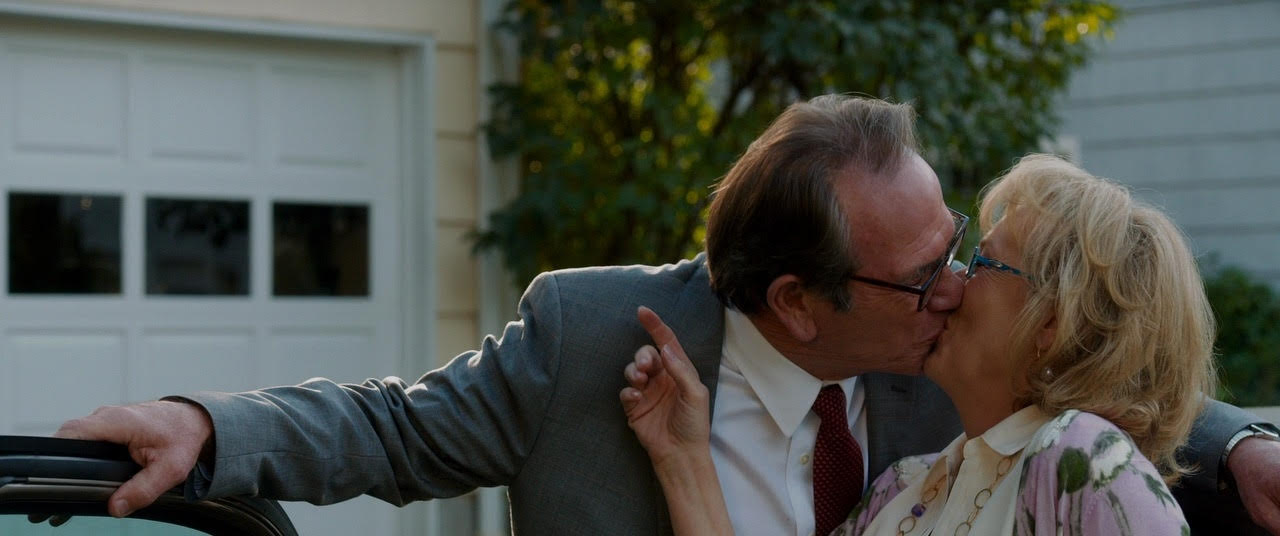
#44 — Kay Soames, a lonesome woman trying to revitalize her stagnant marriage
JOHN: Tommy Lee Jones and Meryl Streep have screen personas as disparate as the parts of a taijitu. While Streep actively courts her audience with vital charisma or some captivating form of transformation, Jones seems just as satisfied to pretend that the audience isn’t there, rarely soliciting our sympathy or even our attention. What a surprise, then, to see each actor force the other to explore previously untapped potentials in this later stage of his/her career and deliver a performance as nuanced and exciting as the very best work in their respective filmographies.
In David Frankel’s Hope Springs, Streep and Jones are Kay and Arnold Soames, a couple married for 31 years who now regard each other like estranged roommates. They rarely speak to one another aside from the occasional “good morning” and “good night.” A hug a day is the extent of their intimacy; they haven’t had sex in almost four years...
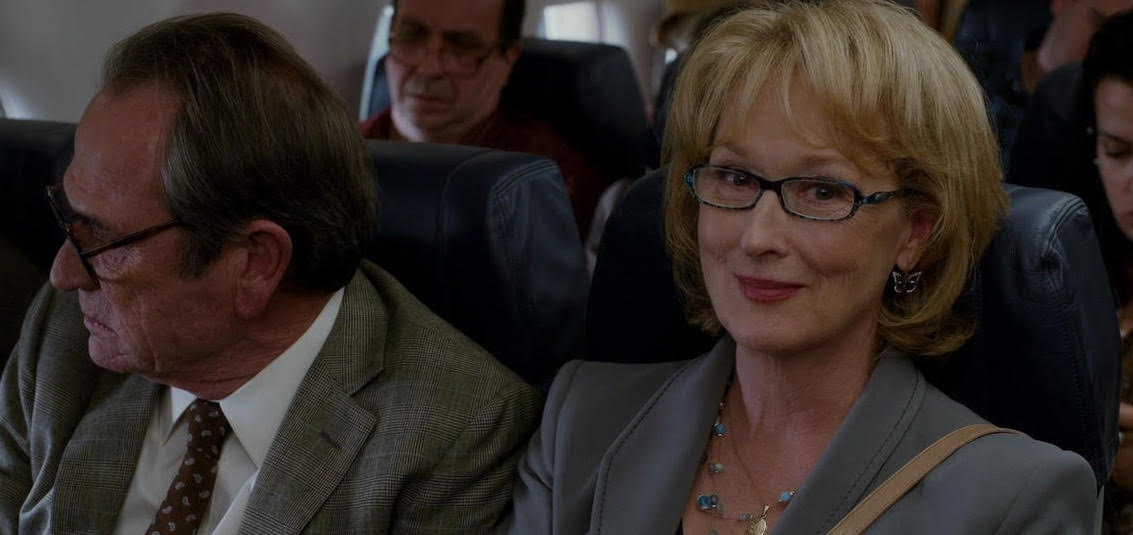
While Arnold seems perfectly content with this routine yet bloodless marriage, Kay is as lonely as ever, her attempts at conversation and connection forcefully obstructed by Arnold’s gruff demeanor. Driven by this depressing loneliness and gnawing disaffection, Kay takes a risky gamble in order to repair her relationship: using her savings, she books an expensive, intensive, week-long couples therapy retreat with Dr. Feld (Steve Carell), a renowned marriage counselor. “I want to have a marriage again,” she tells Arnold, pledging to be on the flight to Maine with or without him. After copious complaining, Arnold begrudgingly shows, inciting a series of awkward, comic, and painful therapy sessions in which an already fading marriage might just extinguish itself for good. Though plainly shot and clogged with obvious soundtrack cues, Hope Springs is an impressively honest look at long-term marriage and probably the closest Streep will ever come to starring in a contemporary version of an Ingmar Bergman marital drama.
Cantankerous and taciturn, Jones has Streep work incredibly hard to counter his exasperating and irascible Arnold. His near-constant stream of objections to Dr. Feld, Maine, the Econo Lodge they’re staying in, and just about everything else he encounters would send any rational spouse straight to a lawyer for a well-earned divorce. Instead, Streep buckles down and insists that Kay’s love for Arnold is able to withstand these outbursts. Behaviorally speaking, when he goes high, she goes low, playing a rational and timid bulwark against his vituperative attacks, choosing to foreground her melancholy rather than spar with him, which we know Streep very well could. When Arnold is unable to cite the recent particulars of their sex life, Kay sits at the edge of the couch and mournfully relates the exact date of their last love-making session. Streep’s low-key performance is a series of small yet inspired inward turns, minute expressions, and vexing deliberations; the possibilities of her either walking out forever or reaching for her husband’s hand seem equally plausible. When Kay flees a particularly tempestuous session, calling Arnold a bully and running away from him on the street, the character may break down but Streep remains in control, her voice and expression firmly pitched in Kay’s subdued register, curtailing any hints of excess.
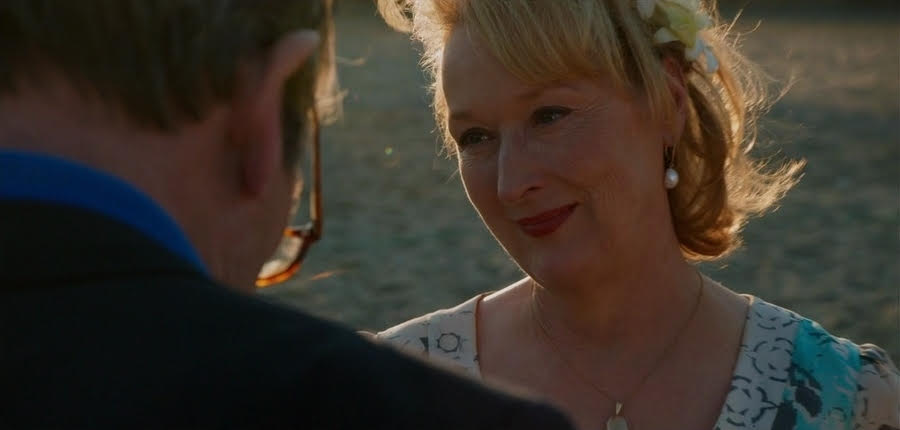
But Hope Springs is not just a glum study of a fading marriage. Streep, ever the comedian, mines comic gold from even the most downcast angles of her script and the more vulnerable angles of her character. When Dr. Feld asks Kay to divulge her fantasy, she says, with complete seriousness, “I want to renew our vows.” “I meant your sexual fantasies,” he presses, and she just laughs. When the prospect of oral sex is raised, Streep coughs and quietly, unconsciously buttons her blouse. Later, during a “sexercise” in a movie theater, Streep’s clumsy inability to perform a sex act (fumbling with her glasses, spilling popcorn) is both hilarious and ultimately devastating. Kay is a woman who longs for the connection and intimacy of sex, but doesn’t consider herself a “sexual” person in the slightest. “I cannot be someone who does an illegal act in a movie theater,” she tells Arnold, incredulous at the idea that this is what’s required to save her marriage or allay her isolation. Kay Soames is not an unconventional character, and she is far afield from the bolder figures in Streep’s filmography. But in Hope Springs, Streep manages a sensitive portrait of this normal woman, whose desire for love is lended the weight and respect it deserves by a performer at the peak of her powers.
There’s so much more brilliance to discuss. I haven’t even mentioned what Streep manages to do with a banana. What makes Kay such a special performance in Streep’s career? Why didn’t Oscar or critics’ groups bite?
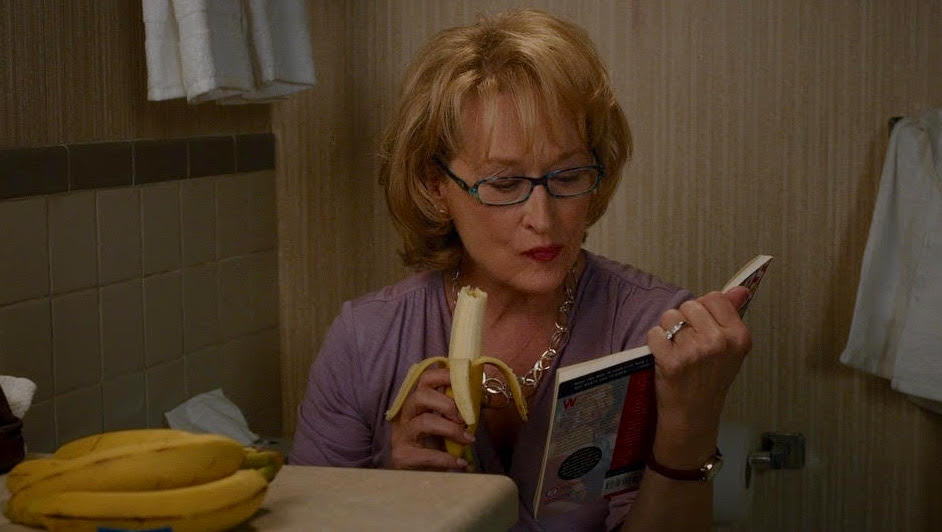
MATTHEW: At one point in Hope Springs, Carell’s Dr. Feld recommends that Streep’s Kay pick up a copy of "Sex Tips for Straight Women from a Gay Man" for some helpful suggestions about how to spice up her long dormant sex life with Jones’ impassive Arnold, which leads to an embarrassed trip to the local bookstore to buy the book, followed by an embarrassed trip to a local market to pick up some practice bananas. In many other films, it would be easy to guess where such a scenario might lead, likely to a cringeworthy punchline about the character’s “hilarious” lack of sexual experimentation. And yet our expectations are subverted in the very last scene in which this running gag is ever acknowledged: Kay sits in the locked bathroom of her motel room, quietly engrossed in the book while holding an unpeeled banana. Arnold knocks on the door to remind her that the two have dinner reservations. Kay jumps a little, but then quickly settles down. She pokes her nose back into the book and proceeds to take a tiny, adorable bite of the banana. And that’s it.
This scene, undeniably humorous but also deeply empathic, is a perfect case study for what makes Hope Springs such a special and sadly underrated outlier in Streep’s filmography, shrugged off by both critics and awards bodies, save for the Hollywood Foreign Press Association, who would probably nominate Streep for an American Express commercial if it could. But Streep fully earned that Golden Globe nomination and many more unacquired prizes and plaudits for Hope Springs, in which the actress is not necessarily flexing her virtuosity, but rather embedding it within the character. Streep’s Kay Soames is self-effacingly average person who is nonetheless alert to everything and always looking forward, even as she wonders, with no small sorrow, if there is anything remaining in her life to look forward to. Make no mistake, Streep’s performance here is a transformative act whose cosmetic devices and dramatic effects may be less conspicuous than those of, say, Sister Aloysius Beauvier, Julia Child, and Margaret Thatcher, but build to a characterization far more rewarding and three-dimensional than the ones for which Streep has received her loudest hosannas this century. The performance abounds with compassion and curiosity for an American woman whose life experiences are appreciably removed from Streep’s own, and the actress spins gold from one of the subtly stronger scripts she has had to work with in recent years, burying herself in the role with the same unfailing commitment that she brought, with lesser success, to a commanding nun, an eccentric culinary icon, and a polarizing politician. It’s a shame that consummate screen acting is seldom praised when applied in the service of characters we might regularly encounter in our daily lives, but what Streep accomplishes in Hope Springs is ineffably moving and no less sweeter for flying under the radar. Kay Soames is a modest individual, but Streep’s work is by no means a minor achievement.
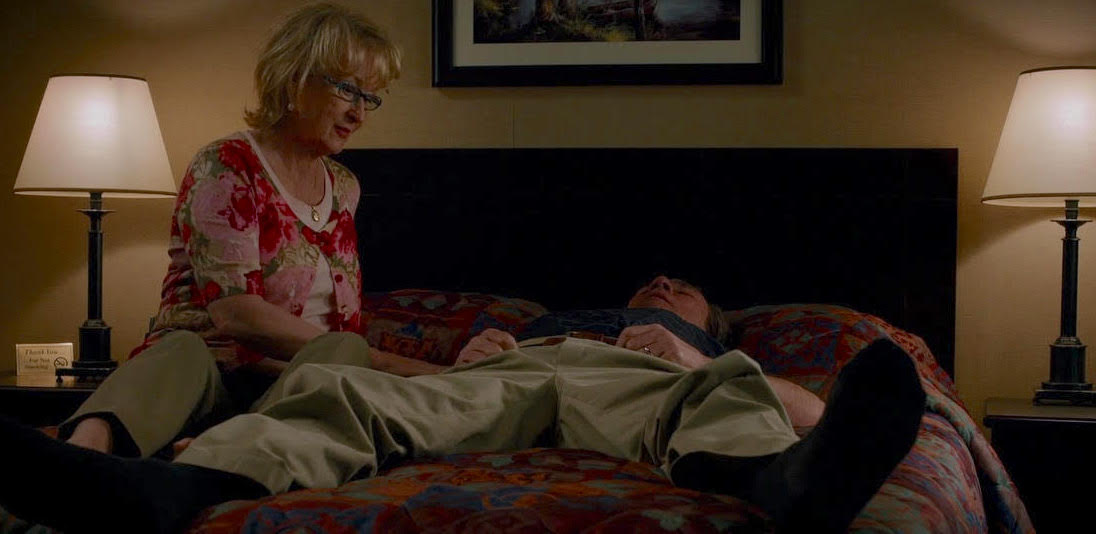
Like all involved in Hope Springs, including director Frankel and screenwriter Vanessa Taylor, Streep never reduces Kay to a stereotype about apprehensive, buttoned-down Midwestern sexagenarians or pokes fun at the traits that another actor or team of filmmakers might be tempted to make light of, including Kay’s crippling lack of confidence, her perpetually apologetic demeanor, or her limited sexual imagination. Streep and her collaborators indicate a great deal of empathy for Jones’ Arnold, but their loyalties and sympathies remain firmly with Kay, who has grown tired of a marriage free of passion and attention. We first meet the character in the Omaha home she shares with her husband, who some years earlier took to sleeping in the guest bedroom due to back pains that necessitated a space of his own; the problem has been alleviated, but Arnold has yet to return to Kay’s bed. In her introduction, Kay, dressed in a slinky blue nightgown, musses up her hair, touches up her face, and slips into her husband’s bedroom in the first of several attempts to recapture the heat they’ve lost. Arnold, oozing uneasiness, rebuffs her offer to sleep in his room tonight, and Kay sadly departs. Throughout this scene and, really, the entire film, Streep’s face remains open and imploring, unable to mask the unappeasable hurt and disappointment that Kay so often feels.
Streep’s central arc revolves around the pivotal question of how much spousal neglect her character can stomach before making a permanent exit, which is no empty threat but an ever-mounting possibility. And Streep’s performance, so exceptionally lived-in and so pure in its intent, makes the stakes of this possibility heartbreakingly clear: it isn’t just a house, which we are instantly convinced Streep knows every corner and crevice of, and a way of life that Kay will have to say goodbye to, but also a bond that, like so many long-term marriages, is filled with too much history, hard work, and deep affection to easily abandon. But Streep gives such credence to the character’s craving for intimacy and nearness that we believe Kay would rather find these things anew if her husband cannot or will not provide them, a devastating realization that the entire performance gradually works toward.
Before this, Streep is generally tasked with playing sweet to the all-consuming sour that is Tommy Lee Jones, who, from Coal Miner’s Daughter to Blue Sky to Hope Springs, has excelled at fleshing out plausible, poignantly imperfect screen husbands of varying temperaments and tolerances. Neither actor shies away from showing us the tough and ugly truths of their characters’ marriage, and their estimable honesty is enough to make you forgive the film’s flat visuals and occasional, sitcommy punchline. Jones bravely resists the urge to make his grizzly bear of a husband any less unpleasant, while Streep refuses to make Kay’s insecurities any more palatable by turning her sweet, soft-spoken wife into a figure of self-validating empowerment. Streep plays up tell-all behavioral choices like Kay’s reflexive laughter when Arnold puts her down or lets his gruffness run rampant, the knee-jerk reaction of a woman used to covering up for her husband’s bad and downright bullying behavior.
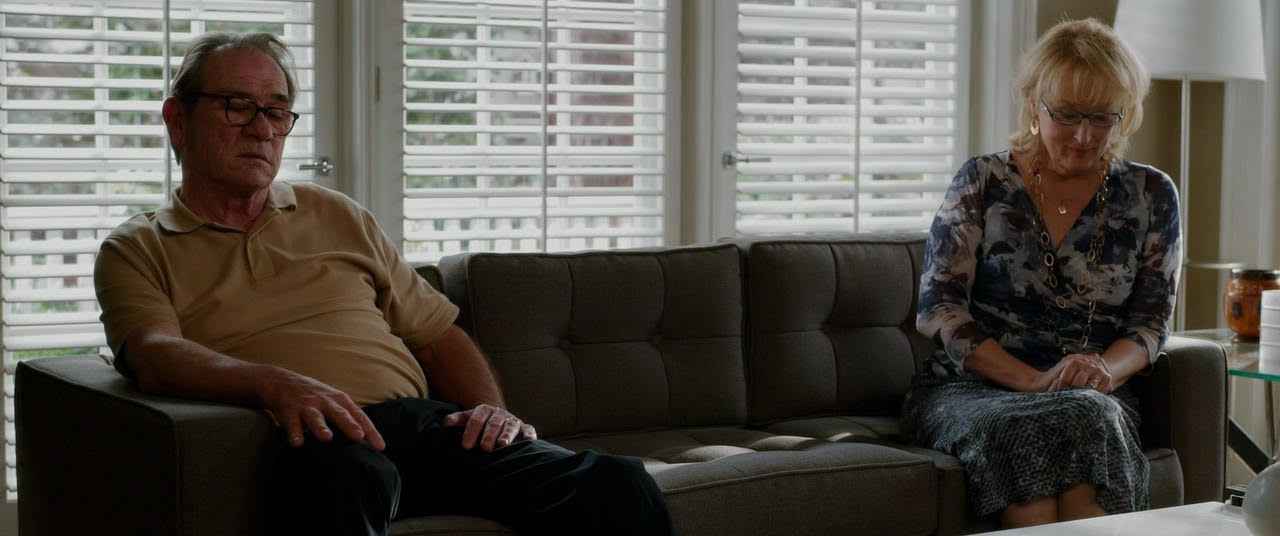
That Kay ultimately finds her own voice and realizes her worth is a testament to Streep’s character-building, but also to Frankel’s actor-complementing direction. The couple’s therapy scenes run long and allow for Streep and Jones to switch up their approaches and discover new facets and feelings in their characters: when faced with inquiries into his sex life, he cringes with silent mortification rather than run his mouth, while she becomes increasingly prone to staring at him with gloomy disbelief, wondering where their fire went and if this can possibly be the man she long ago decided to devote her life and love to. At other times, as Kay freely stirs up old memories from the past and Streep’s eyes widen and sink beneath her protective blonde bangs, the actress makes us understand how painful it can be to open one’s heart to someone who continues to seal off his own. In one gorgeous, extended close-up, Streep’s face passes from nervousness to something like joy when Dr. Feld hands the couple their first exercise of spending a prolonged period of time with their arms around each other; in this moment, we see Kay’s trepidation surrender to her eager — and brave — willingness to put her love on the line, no matter the obstacles in her way.
In Hope Springs, Streep, an actress who has taken us on some unfathomably extraordinary cinematic journeys, illuminates one woman’s search for emotional nourishment, using her peerless talent to tell an ordinary story about what is perhaps the greatest need of all.
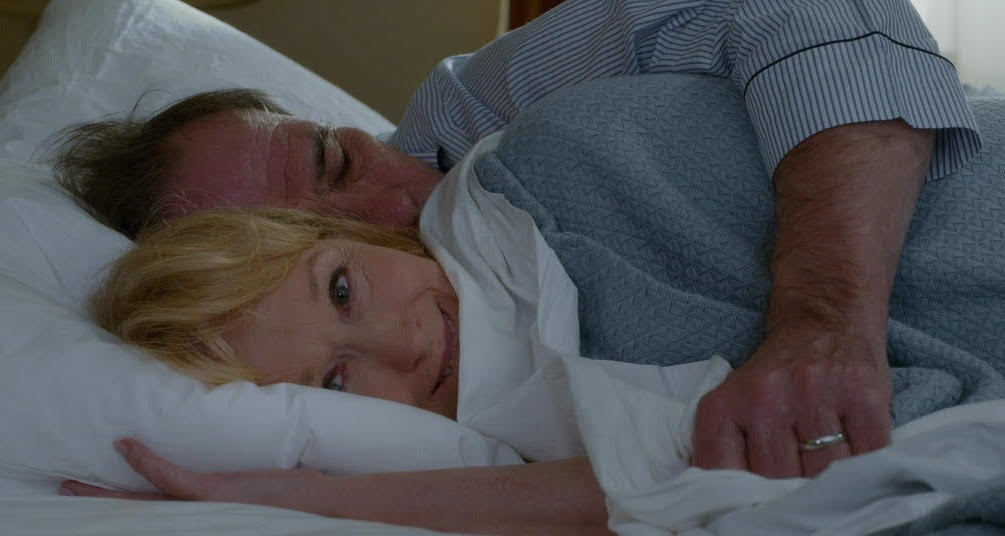
Next Week: August: Osage County



Reader Comments (10)
This is a very underrated movie. It's no surprise that Streep is great (ho hum she nails it again). But the shocker is just how good Tommy Lee Jones is. He's perfection in every scene, and the give and take between the two of them is astounding.
Streep requested no awards campaign for Hope Springs.
Meryl is really great and in no way lesser than the Best Actress winner of the year, Jennifer Lawrence.
Streep and especially Jones are marvelous here.
I think this one TLJ'S best performances,Streep warms him up like a outdoor coat.
Why is this TLJ performance surprising? He's perfect in a role that was tailor-made for him. This is like what Sabrina was to Audrey Hepburn - that's his persona, this is where he excels.
That said, although I think the leads are very good, the movie could never be in the same sentence as Bergman. It doesn't cut deep, it lacks that fearless Scandinavian brutality, and where the director could have milked some great close-ups from Streep, he films everything like an infommercial.
Still wonder how the movie would have played with the original director and cast- Directed by Mike Nichols with Streep, Jeff Bridges and Phillip Seymour Hoffman.
It's not really a Comedy. It does have some comedic aspects... or let's say some situations seem akwardly, so the audience might laugh, but it's more dramedic imo.
It's about two people married for so long, but they live more just in the same house than actually with each other. The wife decides to change the situation, the husband don't want to.
Both huge insecures are displayed differently, with two very different leads, each great of their own.
I was also quite surprised of Carell, who played the therapist really calm, without any comedic aspects.
It's definitely underrated work of all three actors and an underrated film overall, but I'm glad it did good BO.
Though I'm quite sure even with an Awards Campaign, Meryl wouldn't have gone far than a Globe nod. It's just not an Oscar-role.
Hmm ... I can't think of any other American film that has dealt with sex among the over 60's in an honest fashion. Usually old people having sex is a brief joke. Sex for women (or men) over 40 is usually not even depicted. I guess now that even applies to younger people since superheroes don't have sex. I liked everyone in this film. Just saying, but doesn't Streep have twenty or more films that are worth watching? Sure she made some bad ones, but she could have her own film festival or TV channel with the ones that are good.
Hope Springs is a rare film in terms of Hollywood, Nancy Meyers explored this area with "Something's Gotta Give". Credit is due to both of the stars for taking on such delicate subject matters and handling them in an adult way. David Frankel said his direction was informed by his parents who are psychologists.
In any event it gave Streep a chance to work with Tommy Lee Jones, and it's easy to see in interviews that they both enjoyed working with each other.
One last thing, Box office mojo list the film as doing $63 million domestically, and another $50 million in foreign sales. For such a film to do $114. Million is proof that Meryl Streep really is bankable. No wonder that she is still working, that's an incredibly loyal audience, and a very
grateful one.
Without her, this film on a topic that touches a lot of people would never get made.